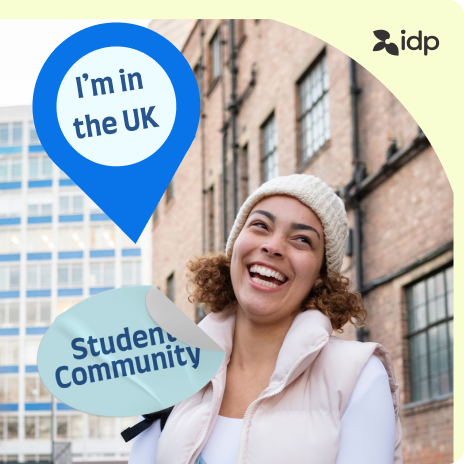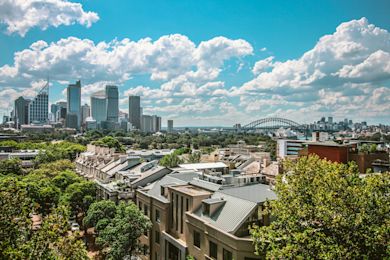Topics covered
- 5 min
- Published: 19 November 2025
- Updated: 19 November 2025
“Studying Abroad was an Experience That Really Shaped who I am Today”
Students from around the globe choose to study abroad for all kinds of reasons. Some do it because they want a degree from a world-renowned university; others, because they feel as if a program that can change their career path isn't available in their own country. For a majority, however, it is the promise of a life-changing experience that pushes them towards campuses and dormitories far from home.
Education counsellors at IDP Canada understand why students choose to study abroad, allowing them to offer the right kind of advice and support, be it for international students studying further in Canada, or Canadian students opting for a program in another country. Interestingly, many of our counsellors started out as international students themselves, giving them a perspective that helps them identify the challenges involved, and offer solutions that make academic goals easier to reach.
We decided to ask some of our education counsellors about their own experiences as students abroad: why did they do it? what did they learn? what advice do they have to offer other students thinking of studying further in Canada?
Our guest this time is Ji Kee Leong, an education and counselling professional with a passion for helping students explore global opportunities.
Ji Kee spent six years in Australia, where she completed her Bachelor of Science in Psychology in Canberra, a Bachelor of Social Science in Psychology (Honours) in the Sunshine Coast, and a Master of Counselling program in Melbourne. She says that living and studying in a multicultural environment shaped her understanding of student well-being and strengthened her commitment to supporting others through important transitions.
After returning to Malaysia, she began her journey in international education. “Over the past eight years,” she tells us, “I’ve had the privilege of guiding students through the process of studying abroad — helping them discover the right pathways and supporting them emotionally as they take big steps toward their future.”
Ji Kee then moved to Canada, where she continues this work while deepening her experience in cross-cultural communication and student support. With her background in psychology and counselling, she strives to bring a warm, student-centred approach to everything she does. She says: “I’m passionate about empowering young people to broaden their horizons, embrace new experiences, and pursue opportunities that can shape their lives in meaningful ways.”
Here are her responses to some of our other questions.
Why did you choose to study abroad?
I grew up with the dream of studying abroad. My brother went to study in Canada and that sparked the idea within me too. Another big reason was my interest in psychology, which was not offered by many universities in Malaysia at the time. I thought that studying abroad would give me better options, better exposure, and a view of how other countries explore this field. I got to explore a whole new country and grew up being more independent. It was a whole new experience that really shaped who I am today.
Student Community
Join the IDP student community
Connect with peers and student ambassadors to hear real experiences, tips, and advise about studying broad.

What did you choose to study in Australia and why?
I’m going to be very honest and say that my initial plan was to go to Canada, not Australia. I studied for an OSSD Ontario Secondary Diploma in Malaysia that was offered by a private college. My initial plan was to complete grade 12 and come to Canada for my bachelor’s. However, when I graduated in December, I realized that the next intake at most good Canadian universities was September, almost a year away. It’s why I began exploring other options and settled upon Australia.
What sort of research did you do?
Once I made up my mind, I began checking out the top universities in Australia, which was close to 40. I checked their rankings and looked at my own results to gauge my chances of acceptance. I then looked at fees to see if I could afford it. Australia is a well-known destination, and my parents have friends and relatives who studied or live there, so I also turned to them for advice.
Did you reach out to an education counsellor?
My college had a student placement service, which is like education counselling. They guided us on choices, admission requirements, and how to choose a city based on personal preferences.
What were your first impressions of Australia?
I went in February 2012 and loved it from the moment I landed. I landed in Canberra during the fall, so it was autumn in Australia. Malaysia is hot, so my first impression of a new country involved falling leaves; everything felt so different.
What did you wish you knew before you moved abroad to study?
Studying abroad is fun, but it can be tough. And when we talk about studying abroad, students often make these decisions when they are young. You dream of freedom, and getting out of the house, and having a whole new life, which is exciting. It's not going to be that easy though, because you are on your own and you must learn to control your expenses. You try and save money and balance the expectations of family and friends.
I did not do well transitioning from Malaysia during my first semester. It’s a different environment where you move from being spoon-fed to studying on your own. No one cares if you do your assignment or attend classes, so you must set your own pace. This is common for most international students who get a reality check in their first year. It’s what I always share with my students when I talk to them, even while telling them that studying abroad is one of the best life experiences I have had.
Did you do any sort of work there as a student?
I did part-time work to gain some experience but more to have extra pocket money and a good meal without the guilt of spending my parents’ money.
What was the nicest thing about studying in a new country and the hardest thing?
The nicest thing is you get to meet a lot of people from all around the world. If I were to stay in Malaysia, I would hang out with old friends but not have any exposure to the so-called global village. After I studied abroad, I realized how I used to have this ‘tunnel vision’ and stereotypes about different cultures.
When you throw yourself out there, you talk to a lot of people. I met my best friend in university 13 years ago — that is the most valuable thing I gained by studying abroad; it’s not just about a degree. Of course, I learned something and earned my degree. I have that diploma in my folder, but it’s not just about that. The people and experiences are the most valuable things you can get.
As for the hardest thing, self-discipline is important because you are no longer under supervision. Self-control is hard, be it while studying or managing a budget. Control over what you do can shape your future 20 years down the road and determine if you will be a successful human being.
What advice would you give any international student who’s thinking about coming to Canada, based on your experiences?
Embrace the experience. Embrace the culture. Make use of your time here. Go out and do something. Don’t stay at home just because it’s snowing. Go out and try some activities, meet people, and build your connections. They are going to be your assets when you are out of college. This advice holds true irrespective of where you go, be it Canada, Australia, or the UK.
Do you have any advice for Canadian students thinking of going to Australia?
Getting to study abroad is a rare opportunity that turns into a memory for life. Going from one corner of the world to another, the weather and geographical landscape of Australia will amaze you, but homesickness will also hit differently. Make sure you do regular check-ins with your close ones back at home.
Students: Do you want to study abroad too?
IDP has decades of global experience helping students achieve their study abroad goals, and now Canadian students can access the same expert support for studying in Australia, the UK, or Ireland.
Whether you connect with an IDP counsellor in Toronto, Vancouver, or online, you’ll get personalized guidance designed to make your study journey smoother and more successful.
One account for all your study abroad needs
Create your profile and unlock a wide array of features including personalised recommendations, fast-tracked applications and much more.











